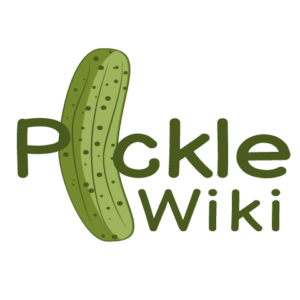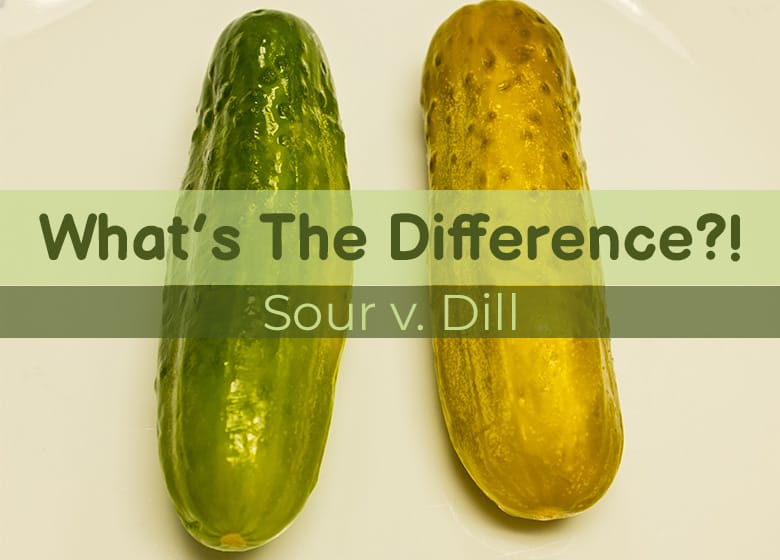With so many existing varieties of pickles in the world, it can be difficult to keep track of the differences between them all. We tend to simply categorize pickles by their taste- sour and sweet. But did you know that sour pickles and dill pickles are entirely different from each other?
Here are the key differences between these two seemingly similar pickle types.
Sour pickles and dill pickles are different because they have distinctly different bases, even though both are made through a brining process. Sour pickles are made with a salt-based brine and no vinegar. Dill pickles are made with a salt brine with vinegar.
While this seems easy enough, there are different subtypes of these two pickles, and plenty of additional ingredients one can use to customize them along the way. Becoming familiar with the brining process and optional additives is the first step to choosing the perfect pickle to either purchase or make at home.
What is the Difference Between Sour and Dill Pickles?
We already know that the key difference between sour and dill pickles is the initial absence or presence of vinegar in the brine, but these pickles have more to them than meets the eye. From variations in processing time to additional spices and herbs, let’s dive into what really makes each of these pickles so unique.
How are Sour Pickles Made?

Sour pickles are what we typically think of when we imagine the basic pickle- crunchy, sour, and refreshing. The sour pickle is fermented in a salt-based brine, and once it begins to ferment, a bacteria called ‘acetobacter’ starts to produce its own vinegar that it releases into the brine.
Before the refrigerator, sour pickles were left to ferment for anywhere between a few months to a year at room temperature, allowing for the growth of probiotics. Nowadays, sour pickles can be completed in the refrigerator at a minimum of three days of soaking time.
The acidic, incredibly salty solution acts as a very strong preservative, and as a result, sour pickles usually stay good and crunchy for a very long time- anywhere from one to two years in the refrigerator.
How are Dill Pickles Made?

While sour pickles create their own vinegar during the fermentation process, dill pickle brine includes vinegar as an initial key ingredient. The other key ingredient is, you guessed it- dill! Dill pickles are put into a water/vinegar/salt-based brine and then left to soak in the brine in the refrigerator for anywhere from a few days to a week. Towards the end of the pickling process, dill seeds and dill fronds are added for that iconic dill pickle flavor.
Contrary to popular belief, the dill seeds are where most of the dill flavor comes from- not the fronds. Other favorite additions include minced garlic, mustard seeds, and peppercorn, but the basic dill pickle only requires cucumbers, vinegar, salt, water, and dill.
Because the brine includes vinegar originally, dill pickles are usually slightly less crunchy than sour pickles but tend to pack in a bit more flavor thanks to the dill and optional spices.
Sour and Dill Pickle Subtypes
The basic sour pickle and dill pickle are the archetypes of their class, but there are also a few subtypes of these pickles with notable differences. While you may have heard of some of these, they might be a bit different from what you had originally thought about them.
There are many distinct regional varieties of these two pickles, but these are a few of the most well-known types:
- Half-Sour Pickles: For some, the overt saltiness of the sour pickle can be a bit too much. The half-sour pickle was invented as a solution to this problem. The alteration is simple: halve the initial amount of salt that goes into the brine.
- As the salt in the brine acts as the main form of preservative for the pickle, half-sours will not keep for as long or be as crunchy as a full sour; but they are quicker to make and milder in taste.
- Kosher Dill Pickles: Contrary to what you may think, kosher dill pickles are not simply a variation of the dill pickle made according to Jewish religious dietary restrictions. Kosher dill pickles are instead dill pickles that are made in the authentic style of the New York City Jewish demographic.
- These pickles are made with an extra generous amount of minced garlic and tend to be a little sweeter than other dill pickle types. Depending on the individual making them, other unique spices and ingredients can be added. The garlic is so integral to the kosher dill pickle, however, that without it, the pickle could not be called kosher dill.
- Polish Style Dill Pickles (Ogorki Kiszone): If the kosher dill pickle emphasizes the minced garlic, the Polish-style dill pickle focuses on the dill and spices. Dill seeds and fronds are added plentifully for extra flavor, and these pickles have more spices and herbs in them than regular or kosher dill pickles, giving them a stronger and more diverse flavor profile.
- Many Polish dill pickles taste distinctly of mustard seed and peppercorn, but what really makes this dill pickle Polish is the fresh horseradish. If you’re someone who prefers a pickle with a distinct spice, ‘Ogorki Kiszone’ are the ones for you.
Health Benefits of Sour and Dill Pickles
If you thought these two pickles were only great for their taste, think again. Not only are sour and dill pickles packed with crunch and flavor, but they also offer various health benefits:
- Probiotics: Sour pickles, when made through the true fermentation process, contain a probiotic called lactobacillus. This bacteria is extremely beneficial in cultivating a healthy gut flora, aiding digestive health. *Note: dill pickles, because they are brined with vinegar, do not contain probiotics.
- Antioxidants: While cooking foods on high heat destroys some of the nutritive value it originally held, both sour and dill cucumbers are brined in such a way that they preserve all of their original nutritional benefits. Thus, the antioxidant effects of the cucumbers retain their strength. These are known to help fight free radicals and detoxify your system.
- Electrolytes: Pickles, especially sour pickles, are made with a lot of sodium. This sodium increases their levels of electrolytes, as well. Pickle juice has historically been used as a way to fight dehydration, and some athletes drink pickle juice after a workout to restore their electrolyte balance naturally (Source: MedicalNewsToday)
- Vitamin K: Cucumbers are a natural source of vitamin K, a vitamin that helps prevent the formation of blood clots and blood thinning. In fact, a whole dill pickle contains 23% of your total daily recommended amount of vitamin K (Source: WebMD). It also may be beneficial in improving bone strength, thus fending off conditions like osteoporosis.
It is important to be aware that these health benefits differ depending on whether you’ve purchased the pickles at the store or made them at home. Because store-bought pickles are full of extra preservatives and often did not go through a fermentation process, if you bought pickles at the store, the chances of them containing probiotics is “very low” (Source: mbgfood).
Figuring Out The Difference Between These Pickles Yourself
Making either of these delicious pickles at home is an easy and quick process that requires very few ingredients. Therefore, if you really want to reap all of the benefits from these nutritious and tasty cultured cukes, making them at home from scratch is your best bet.

